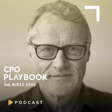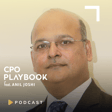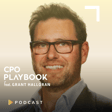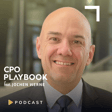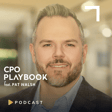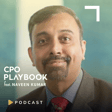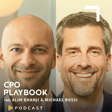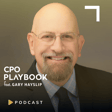Become a Creator today!Start creating today - Share your story with the world!
Start for free
00:00:00
00:00:01

The Path to Promotion at Work
Ready to unlock the secrets of successful succession planning? In this episode, we dive into the heavy lift of succession planning and talent development with Marc Effron, President of The Talent Strategy Group, who introduces his innovative approach known as the "Talent Production Line." Join us as we explore the critical components of this groundbreaking framework and its profound impact on creating a successful leadership pipeline. We’ll tackle the challenges in talent management and share practical steps for future-proofing your workforce. Don't miss this chance to transform your approach to talent development and discover how to navigate the evolving landscape of succession planning strategies!
Transcript
Introduction to the CPO Playbook Podcast
00:00:05
Speaker
Hello, everyone. I'm Felicia Shakiba, and you're listening to the CPO Playbook Podcast. Join me and my guests as we feature insightful conversations with HR leaders, people scientists, and executives from diverse industries and functions, offering valuable perspectives on the future of work.
00:00:23
Speaker
Discover a unique outlook on navigating the complexities of the modern-day working world, exploring innovative strategies in talent management and corporate culture from the chief people officer's perspective. Tune in to stay ahead of the game when it comes to all things people related.
What is the global talent shortage and why is it severe?
00:00:44
Speaker
The challenge of finding skilled talent has reached critical levels for employers globally in 2023, with nearly four in five reporting significant difficulty, a figure that has strengthened by two percentage points year over year. This issue has more than doubled since 2015, when only 38% of employers face such challenges, highlighting the growing urgency of talent shortage problems.
00:01:11
Speaker
To address this pressing concern, organizations can turn to the concept of a talent production line.
What is the 'talent production line' strategy?
00:01:17
Speaker
This strategic approach involves systematically identifying the key skills and capabilities required for specific roles, selecting and nurturing the right individuals for these positions, and efficiently distributing talent where it's needed most.
00:01:32
Speaker
By implementing a disciplined talent production line, organizations can mitigate the impact of talent shortages and proactively build a workforce tailored to their evolving needs, ultimately driving business growth and resilience in a competitive market.
Mark Efron on talent management strategies
00:01:49
Speaker
Joining us today is Mark Efron, president of the Talent Strategy Group. Mark, welcome to the show.
00:02:02
Speaker
Very happy to be here. Thank you for the invitation.
Applying manufacturing discipline to talent management
00:02:10
Speaker
A talent production line is a way of thinking about building better talent faster. Here's the concept. Most companies take a lot of care with the products and the services that they produce. They want to make sure that they've designed that product properly. They put the best raw material into it. They have a disciplined process to build it. And they certainly want to get it to the customer who's anxiously waiting for the product.
00:02:35
Speaker
Why don't we take at least as much care with our people as we do with our products? We know how to build people. If you've been an HR, you're smart enough to know how to grow people. But in many cases, we have a very undisciplined process around doing this. So the concept of a talent production line says, let's apply that same care and discipline. Let's start by saying, what are the specifications for what we're trying to build?
00:03:02
Speaker
Because if you can't clarify what you're trying to build, you're going to be producing random talent because you're just trying to grow people as opposed to people with particular skills. So let's start by saying what specifications are we trying to build to?
Steps to implement a talent production line
00:03:15
Speaker
And then raw materials. Think of this as your talent review. You have lots of good talent in your company, but not all of it can be built into what you specified. How predictably accurate are you?
00:03:27
Speaker
in saying, oh, I think Susie can move this far, this fast into this role. So a good process for sorting through all of your talent. Call that raw materials. Third step out of four, production. This is where most companies fall down, which is do you know
00:03:42
Speaker
the right sequence of experiences, exposure and education to actually build that talent. So if you're trying to build a good general manager, do you know what the steps are to build a good general manager? And are you moving people through those steps in a disciplined way? Final step distribution. Two things get in the way there. Sometimes leaders hold on to talent too long. Sometimes the talent doesn't go where you want them to go. But the overall concept says let's take at least as much care
00:04:11
Speaker
with our people as we do with our products and services and have a disciplined approach to building. So in your experience, what are the common misconceptions or challenges that organizations face when it comes to talent management?
Challenges in talent management and solutions
00:04:25
Speaker
And I know you alluded to it earlier. You said most organizations fall down at step three, which it sounds like a learning and development piece. But how can a disciplined approach like the talent production line address them?
00:04:40
Speaker
I think the largest and most painful misconception, which is that leaders are good at developing people. There's no reason to assume that leaders are good at developing people. That's not their job. Their job is to produce a bar of steel, to produce an advertising campaign. They do lots of stuff really well. Why would we expect their development experts, because they're a VP?
00:05:03
Speaker
They might have gotten to a VP by being very brash and smart. There's nothing to do with developing other people. So the challenge in too many cases is that we allow leaders to develop in typically their own image and some are very disciplined and structured about it. Some are not.
00:05:19
Speaker
One of the benefits of the production line is to say we collectively, we in the company have a point of view about the right way to build people. We're going to build people in that way. You, Ms. Leader, Mr. Leader, are certainly a valuable piece in that process. But we're not going to say, oh, I know how to build people. You throw them into tough assignments and give them harsh feedback. Maybe that's not the way we believe in building leaders.
00:05:43
Speaker
So we're going to try and get that variability squeezed down a little bit. I mean, you still need to allow some variability, but we're not going to allow individual leaders to make every decision about how to build our best talent. And along with that, even those leaders who are committed, they're very busy recognizing that there needs to be accountability
00:06:04
Speaker
for leaders in producing talent, I think is another key missing element. Many companies don't understand that some leaders are naturally attuned to that responsibility. Others are. And unless there is some accountability to actually produce more better quality talent, some leaders are going to do that. That's interesting because I think that we would all love to assume that because our leaders are in their position because they can develop talent and build teams.
00:06:32
Speaker
But I think that you're absolutely right when not all organizations identify leaders as someone to be put in that position because they can develop teams well, but rather they can actually execute.
Case study: A food company's success with talent production line
00:06:46
Speaker
So that's interesting. Can you share a real world example of an organization that successfully implemented a talent production line strategy? And then what was the impact?
00:06:58
Speaker
Sure. There are a few that come to mind. The one I like best is a large food company. And their challenge was they needed more general managers. Their expansion strategy was based on we need to put more general managers into workplaces. Without them, we cannot grow.
00:07:16
Speaker
And they did an OK job at pulling people from parts of the organization and trying to shape them into general managers. But their CEO said, I want more of these people and I want them quickly. CHRO came to me and said, what do we do? I said, let's set up a disciplined talent production line. Let's start by saying, what is a good general manager here at this company? Let's define that probably one of the most important parts of a talent production process. Or there are 40 things that leaders need to do.
00:07:44
Speaker
Yes. Do I care about all those 40? No, I care about the six, five or six that really differentiate a great general manager. So first process is let's go speak to the great general managers within this company, help to understand what does differentiate great general managers. We bring in some of our own knowledge as well because we've done a lot of this work. So let's start with what are those specifications? We went through that process and that's relatively fast. It's three weeks, four weeks to get the specifications.
00:08:14
Speaker
And then the key question I mentioned earlier, raw materials. And raw materials is normally if you have a talent review or a succession planning process, that's where you look at all of your talent, try to figure out who can move artists and fastest. The question was, well, we already have talent reviews in this organization. How do we use those talent reviews to select out general manager candidates?
00:08:35
Speaker
The decision was you have to be hypo already. So you need to get through this process and be considered a high potential leader. And then it's plus we think you have the ability in the future to demonstrate some of these specifications. So in that talent review process, the conversation was, oh, Susie and seeing are both high potential. Great. Do either of them also display the potential to show us the capabilities that we identified in that specification step?
00:09:04
Speaker
So they decided we're going to get to this talent by having them be not just the best, but the best with a specific set of peer capabilities. And that was actually relatively straightforward to add in. We charged the HR leader with being the person who needed to take that data and then move it forward to the next step of production.
00:09:22
Speaker
So we know what the five or six differentiators are. We now know who the candidates are. The question is, what are the paces that we move them through? So what's the where the experiences, the education, the exposure and the same process
00:09:37
Speaker
was used to discover those materials, those ingredients as was used to determine the specifications. Let's speak to people in the organization who have grown. Let's see what steps they went through. Let's add in some of our objective advice as well around that came to some surprising conclusions about what things were necessary, what things were not necessary.
00:09:58
Speaker
some things that we would not have predicted, like being part of an M&A, were critical. People said, you learn so much about the company and the breadth of the company in that process. We want people to go through some project management piece of an acquisition.
00:10:14
Speaker
And so we built out those steps. We identify, I think, 12 or 13 different experiences, found that there was no additional education that anyone said was needed. So in that classic trio of experiences, education, exposure, people said, no, formal education is not important. We pushed on that art. That sounded unusual to us. No self-awareness classes, nothing else. We're like, no.
00:10:37
Speaker
Okay. And then exposure, they decided actually a lot of that is covered in the experiences. So they're going to get proper exposure to senior leaders, new markets, factories, et cetera, by going through the experiences. So bring that story around. We now know what those 12 experiences are.
00:10:54
Speaker
the job of the HR project manager for this production line, so they sign a full-time person, your job is to manage the production line, is to say, okay, we know that Susie has had these three experiences. The next one she should get is either A, B, or C. I, as the HR leader, are going to shop around the company and figure out where that next experience is because we don't want to have a pause in that production line.
00:11:22
Speaker
We don't want Susie setting at step three for four years when she could actually learn everything in 18 months. So it was a very actively managed production line, which I think for our listeners is probably the secret of making this work. It's not that you build a production line, it's that you move people through it. If you build a production line for cars and the metal never goes forward, you do not have a car.
00:11:43
Speaker
You need to move people through the production steps. And so that was happening. And then distribution, the final piece, part of that we made easy at the very beginning. And the part that was made easy was the talent understood. We will put you places that we think are the best places for you to grow as a GM.
00:12:02
Speaker
This company didn't necessarily have factories in garden spots. So sometimes you ended up in a place you didn't want to end up, but you needed to trust the company that this was the best place for you because we have a disciplined production line. And then for preventing leaders from holding on to talent too long, the company is also very clear. We are loaning you this talent for 24 months.
00:12:24
Speaker
Your job is to steward them, help them grow. We will take this talent back in 24 months to move them somewhere else." So it's a very long story around it, but they were very disciplined around, we want more, better, quality talent faster. We know we need a disciplined process around that. We know that we need someone to really ride herd on or project manage that. So we're not just hoping that leaders will do the right thing.
00:12:48
Speaker
What does a typical timeline look like for a production line? And my second question, what is a typical timeline that you expect this production line to take place? And the other question I have is let's say you select or identify these high potentials that don't always fit in a role and that's available. So how do you continue moving that talent
00:13:11
Speaker
when maybe those roles are not available to them. Sure. On the timeline, I'll give you a consulting answer, which is it depends. It really depends on how big of a job are we talking about. So for the general manager, we were taking people who were already mid or low to mid career. So they had 10 to 12 years of experience.
00:13:30
Speaker
And the thought was three big experiences plus what they have now. They're probably at least pretty darn close for maybe a small general manager job. So for them, the timeline was we want to have a lot of general managers coming off that production line in five years, which they are estimating was three to four experiences that someone would get in addition to what they already had.
00:13:53
Speaker
Now, does that complete their development? No, that was simply, oh, you're pretty good after those. And we're going to have confidence moving you into a role, but we're going to still produce you so that you can grow into larger, more impactful GM roles.
00:14:08
Speaker
So timeline is going to vary for this particular organization. It was five years. I would suggest to produce anyone. Let's assume it's at least three experiences or three turns. If you're very efficient, that's 18 months each. So five years feels like the minimum time.
Advancing high potentials without immediate roles
00:14:24
Speaker
Ten years feels like the maximum recognizing predicting even five years out. It's very challenging. Who are we going to be as a company? Ten years out is even further. You're taking a really big bet.
00:14:35
Speaker
or placing a really big bet that things will be relatively consistent for some of these roles over time. And to the second part of the question around there's not an opportunity or not the ideal opportunity available for that individual when they need to be there. A lot of it comes down to how are we prioritizing of the 10 people in this production line? How are we prioritizing who gets what assignment?
00:14:58
Speaker
So part of it is, well, the next best assignment that opens up, we're going to give to our best candidate. We've also worked with firms, the one I've described to take this approach. We've worked with other firms where they will be very aggressive about moving people. So if Mark is in a role that we need to put Felicia in,
00:15:15
Speaker
We're going to move Mark out of that role. We'll find somebody else for him or we'll give him a big check and send him on his way. But we're not going to allow Mark to interrupt the flow of that production lines because he's doing an OK job. Now, is that a very aggressive posture? Absolutely. That's what your challenge philosophy is that OK or is that not OK?
00:15:32
Speaker
I love that you brought this up. I think that's not something I've heard before, like move somebody out. That's just doing an okay job, you know, but to move the production line. I think that signifies that an organization who's going to take that stance is very serious about moving up high potentials, whether or not there's a spot available, which I think is exciting and could be very controversial.
00:15:59
Speaker
in some cultures. I think a lot of people though would actually feel like the work that they're doing is more valuable because they know if they do good work, they're going to move in their careers and they're going to move forward. I think if you don't do that, the flip side of it is that the person is ready and they say, well, there's no place for me to move in this organization, so I'm going to look elsewhere. And I think that's kind of where you're getting at with what you're doing.
00:16:27
Speaker
It also means that you need to be very transparent with your team members about that being your philosophy, because if Felicia comes to market says, Mark, we're moving out to put Susie and I say WTF. Yeah, that's not how we operate as opposed to everyone knows we have a talent production line and we're going to make sure we treat everyone with care and consideration. But if you're in that marketing analyst role and that's a key step and we only have one of them, well, guess what? We're going to move somebody else into that role.
00:16:55
Speaker
So a lot of it is I'm a big fan of transparency. Let's be transparent with people about our talent philosophy in the organization and how we manage people so that you can either sign up for that and say, oh, I think we should be managed that way. Or even say, oh, I don't like that at all. I'm going to work somewhere else. But let's not surprise people with moves like that. Yeah, absolutely. That communication and transparency, I think, is key.
00:17:18
Speaker
So how can organizations ensure that they are effectively nurturing and developing their talent during the production phase of the production line? And are there any data points that we should have in mind? I would suggest this is classic
00:17:35
Speaker
feedback, feed forward along the way, making sure people understand where they are in the production process. So going back to transparency, if I'm moving Felicia to the general manager steps, it's a very explicit conversation around Felicia. We're moving you to this factory outside the U.S. because one of the boxes we need you to check is an outside the U.S. experience. So you know why you're going there.
00:17:58
Speaker
And here are the three things that we want you to learn in that experience. So during that experience, either your manager, talent leader, HR leader is coming to you and saying, hey, Felicia, we're hearing this feedback about your ability to operate well in other cultures. Or Felicia, we've got a bit of a challenge to your ability to operate in other cultures. But it's very clear about here's what we need you to learn or demonstrate or do at this step. And here's how we think you're doing it.
00:18:24
Speaker
Now, that takes a very purposeful approach. So back to having someone project manage this as opposed to hoping someone gives Felicia the right feedback at the right step. This means you're very purposeful, very disciplined around making this happen. So care and nurturing is really what we would probably hope we do for every employee. But what we're saying on that talent production line is, well, it really, really matters that we do it on the talent production line because we're spending a lot of time, effort and money to make this work.
00:18:52
Speaker
And so to ensure that that's happening, it's about making sure that people are giving constructive feedback as well as receiving it. Right. And is on a continuous basis and it's part of the culture. Right. Ideally part of the culture. The key is, do I as the participant in that production line know what I'm supposed to be learning?
00:19:15
Speaker
Am I getting some feedback about whether I'm doing a great job, an okay job, or not a very good job at doing that so I can make sure I'm moving down that line? Because not everyone makes it to the end of the production line either. It might be that we move you to an outside the US experience, you do an exceptionally poor job, and we say, okay, that sends a pretty big signal that you might not be someone who fits into this category.
00:19:38
Speaker
Now, it doesn't mean you might not be a great M&A leader or marketing specialist, but we might say that's a big deal for our GMs. Therefore, you don't fit. So giving the feedback around kind of how you're progressing critical, even if it's not part of the culture, ideally, it is part of the culture. But even if it's not broadly part of the culture for that narrow segment that we're actively producing, let's make sure it's part of that culture. Talent production line implies a structured and systematic approach.
00:20:08
Speaker
How can organizations balance the structure with the need for adaptability? So for example, I've seen organizations identify and ready talent three years ahead of time and later find out that there are different skills that might not be needed, for example. And I know that you kind of mentioned this before.
00:20:27
Speaker
It's a great question. And I think part of it depends on how fast is your industry of all. So we do some work with oil and gas companies. They pull oil out of the ground. They've always pulled oil out of the ground. They will continue to pull oil out of the ground.
00:20:44
Speaker
So I could be relatively confident that if I'm producing a petroleum engineer, then the capabilities that we need from them are relatively predictable and that over 10 years we're going to build a great petroleum engineer.
00:20:59
Speaker
Now, if I'm in AI right now, we have no idea what AI is going to look like three years from now. And so about the best you can do is say, well, probably one of two things. One, what is a good generic, not generic in a pejorative sense, but a good solid leader
00:21:16
Speaker
at XYZ company look like. Great. Let's make sure we're building good solid leaders. They're skilled in leading projects, giving transparent feedback, creating good strategy, typical leader stuff. So it could be that one part of the production line is independent of our challenges, we need people who can operate at the director level, at the VP level. We think that means
00:21:37
Speaker
So, one track could be that. An additional track could simply be a very flexible and adaptive track that says we're going to be always scanning the market and we might change that production line every six months. We're going to let you as the participant on the production line know that you're in AI, this is a fast evolving field. So, what we told you might happen in two years might happen in six months, might not happen at all.
00:22:03
Speaker
Please be flexible with us as we say we're going to pick the best path for you, even if we can't see three years out. So I think simply saying we would love for there to be a rigid and predictable path with new technology. There's probably not. So we'll have one path that builds you as a good generic leader and an additional path where we do our best to keep current with a rapidly evolving.
00:22:26
Speaker
It sounds like the leadership competencies are going to likely be fairly consistent because we have done a lot of research around leadership and what that good leadership looks like. And so that adaptability could change maybe in the hard skills or new technology. But at the end of the day, we have a really good idea of what leadership is still going to look like.
00:22:51
Speaker
Absolutely. So if we start with the thought of, if I can give you 10 brilliant leaders and you simply need to build some technical competency on top of them, would you be okay with that? Answer's probably, yeah. Maybe they want Ultra to be technically perfect as opposed to I can give you 10 people who are technically sharp, but they're not particularly good interacting with other human beings. Are you okay with that? Answer's probably, I'd prefer not to have those people in the company. So I would rather
00:23:16
Speaker
spread my bets around a bit and say, if nothing else, they're really good at doing stuff we want leaders to do and then hope that we can keep pace with the advancements.
How does talent production line improve retention?
00:23:28
Speaker
Organization struggle with employee retention. How does that talent production line contribute to employee engagement and retention? Sure. Talent production line does a great job at retention of the people on the production line. Now, that's going to be a narrow segment. Not everybody's going to be in a talent production line.
00:23:46
Speaker
So for the folks who are on that line, they're going to feel special and invested in and get very clear messages that we believe that they have a great future. So I think for that limited segment of people, we can say we're probably doing all the right things to keep them engaged and interested and retain them.
00:24:05
Speaker
I would suggest more broadly what we need to do is help others outside of that structure and production line understand that same concept and apply it to their careers. So if I'm a junior marketing person, how do we help that junior marketing person who wants to be head of advertising understand here are the seven or eight experiences that people normally move through going from your role up to head of advertising.
00:24:30
Speaker
You don't need to have them all, but you probably need to have a decent number of them. And you should be planful in the next experience you get, if that's what you want to do. So even just helping people to understand there's a relatively logical, not perfectly, but relatively logical progression that you go through in many careers. Let's be clear with you about what that is.
00:24:49
Speaker
as opposed to you guessing about it or your leader making up what she or he thinks is the right fit. Say, we have a point of view about what grows a great finance leader, a great marketing leader, a great IT leader is, we call those experience maps. And it literally is just a sheet of paper that says in this particular function, here are the experiences that we think are the building blocks of your career.
00:25:10
Speaker
and really use that in conversation. So if you're my manager, we drop that experience map between us in the conversation. You say, Mark, you've had A, B, C, and D. For the next experience, there are two or three here that I think would be helpful. Let's talk about those. So take that scene production line concept, which is we have a point of view about specifications.
00:25:30
Speaker
And we simply need to move you through those various experiences to help build those specifications. It might not be as disciplined or as structured. You will get as much love and care, but at least you are clear about this is how people develop, as opposed to what we talked about at the beginning of the podcast. Let's hope Felicia is good at this stuff, as if she's not. My career is not going anywhere. Earlier, you talked about the criteria of identifying talent in the production line.
00:25:58
Speaker
How would you identify talent? Like, what is the criteria you would recommend? Well, I think that's still the big, unanswerable question in our field. We're getting better at predicting potential. We're still, the science is still maturing around that. I would suggest in most companies we need to think more broadly, meaning too often we say, well, an individual is high potential.
00:26:21
Speaker
Well, that's dependent on what does the company need. If you're an entrepreneurial company, high potential might look one way. If you mature and you become a more operationally focused company, high potential might look like something else. So I think the starting point is to say first,
00:26:37
Speaker
High potential is the intersection of really smart, capable, motivated individuals with the specific needs in my company. I'm going to start the individual side with pretty well proven factors around intellectual capability, cognitive horsepower. Really smart people tend to succeed more than less smart people. And the more technical the role, engineer, doctor, scientist, those smarts are even more predictive of success. So are they cognitively smart?
00:27:07
Speaker
Now, most people at the manager director level are smart enough to do most jobs. So it's not a huge screen in most organizations, but I think coming into an organization, it's worth looking at their ability to apply that cognitive force power. So it's not an IQ test. It's can they apply those smarts to process information well?
00:27:27
Speaker
the right personality factors. Again, we can select for that. There are lots of great tests, but in many ways it's, are you committed to right tasks? Do you interact with other people? Well, are you open to new ideas? The literature is pretty strong around that. And then the big open question that I think we don't ask often enough, and I think the answer has changed over the past few years, the pandemic is, do you want that bigger job?
00:27:54
Speaker
because ambition is a key predictor of potential. If I'm smart, hardworking, have all the right personality factors, but I'm absolutely fine in my current job, well, then I'm probably not high potential because I do not want to move up into a role of larger responsibility. So third question I want to ask an individual is, what would you like to do here?
00:28:15
Speaker
And some of that, I think we need to be a bit more inclusive. And if I say, oh, I'm good where I am to push a bit and say, that's great. Here's what I see in you that makes me think that you could do a B or C if you chose to. Are you opposed to doing those or just not comfortable raising your hand around that?
00:28:34
Speaker
because I read an article many years ago, something the title was shy pose. There are people who are probably really good, but they're just not showing up the way that we think a hypo is going to show up. And too often sort of a bit of a diatribe here, too often hypo show up because they are people who are very comfortable bragging about their own accomplishments, waving their hand around, volunteering for assignments, getting to know people well.
00:28:56
Speaker
That's helpful, but that's also predictable. It tends to be white extroverted men who do that extremely well. One reason why we see a lot of white extroverted men in senior level positions, it's because we've projected that's a good leader as opposed to saying, what do we really need in that role? Why don't we look carefully as opposed to saying, I had lunch with Bob. He's a really good guy. So a little more discipline around that assessment I think could be super helpful. That's my thought on the topic.
00:29:26
Speaker
Very interesting. I think that diversity does play a role in identifying the right criteria. And I think that's a hot topic maybe for a whole another episode.
Emerging trends in talent management post-COVID
00:29:37
Speaker
But I would love to learn as we look to the future of talent management, what emerging trends or changes in the business landscape do you believe will have the most significant impact when we look at the emerging trends and changes? Obviously,
00:29:54
Speaker
post-COVID, work from home, fully remote the debate over that. I think we'll have significant changes that we don't yet know the answers to, meaning there's plenty of surveys out there that people say, oh, I'm more productive at home. There are plenty of CEOs saying, no, you're not, get back to work. We don't have any science right now that gives us answers to important questions like,
00:30:17
Speaker
Do people collaborate better in person or not in person? We probably have a point of view around that, but we don't have good facts around it. Can I get to know you well enough that I feel comfortable promoting you if we have not actively worked together in person? Can I build relationships over Zoom? We don't have answers to some of those questions that have been fundamental in determining how we manage people.
00:30:44
Speaker
Five years ago, would I have ever promoted someone who had never shown up in the office? No. Why haven't they been in the office? What's wrong with that? Today, that's a very legitimate question. I haven't seen Susie. I've never seen Susie in the office. Is that OK or is that not OK? Is it my weakness in not feeling comfortable with Susie or is there something additional that we have to do to build that relationship?
00:31:07
Speaker
So I think a lot of the changes are going to evolve once we have more real facts, not surveys, not shouted opinions, which we have a lot of these days about, oh, the right thing to do is X. I think once we know more about how people interact and succeed or don't succeed in more hybrid environments, we'll have much better answers about how to manage people in this very new world. Mark, thank you so much for being here. This insight is so amazing and we appreciate your time.
00:31:37
Speaker
Thank you, Plicia. Great conversation and hope your listeners find some good insights. That's Mark Efron, president of the Talent Strategy Group.
Episode conclusion and feedback
00:31:52
Speaker
If you like today's podcast, we have more podcasts on innovative HR strategies, talent management, organizational culture, and more, and how to navigate the complexities of modern day HR. Find them at cpoplaybook.com slash podcasts or search CPO Playbook on Apple Podcasts, Spotify, or wherever you listen.
00:32:15
Speaker
Thanks for listening to the CPO Playbook Podcast. We'll be back with a new episode. Next time, I'm Felicia Shakiba. If you love CPO Playbook, the best thing you can do to support us is become a subscriber. You can do that at cpoplaybook.com slash podcast. That's cpoplaybook.com slash podcast. If there's an episode you loved, please share it with a friend.
00:32:42
Speaker
And if you have an idea you would like us to talk about or a guest you'd like to nominate, visit cpoplaybook.com slash contact us to suggest an idea.
